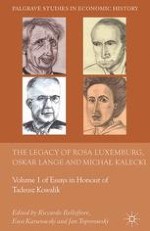2014 | Book
The Legacy of Rosa Luxemburg, Oskar Lange and Michał Kalecki
Volume 1 of Essays in Honour of Tadeusz Kowalik
Editors: Riccardo Bellofiore, Ewa Karwowski, Jan Toporowski
Publisher: Palgrave Macmillan UK
Book Series : Palgrave Studies in the History of Economic Thought
